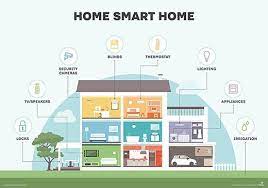Smart home
Smart home, also called intelligent home, is a concept that refers to the integration of technologies and devices into the home environment, with the aim of improving comfort, safety, efficiency and energy efficiency for residents. In a smart home, various devices and sensors connect to the Internet and communicate with each other, which enables their remote control and monitoring via a smartphone, tablet or other device.

Smart home operation:
Devices and Sensors: Various smart devices are installed in a smart home, such as thermostats, lighting, door locks, camera systems, speakers, robotic vacuum cleaners and many others. These devices are equipped with sensors that record information about temperature, humidity, movement, light and other parameters.
Communication: Devices are connected to the Internet and communicate with each other via wireless technologies such as WiFi, Bluetooth, Zigbee, Z-Wave and others. This communication enables mutual control and synchronization of devices.
Central control platform: A central control platform is used in the smart home, which allows the user to manage and configure devices, set scenarios and monitor the state of the house through an application on a smartphone or computer.
Automation and programming: The user can set up different automated scenarios that react to different conditions such as time, movement, light and others. For example, the lights may turn on as you approach the door, or the temperature may rise when it gets colder outside.
Possibilities of using Smart home:
Lighting control: Allows you to turn on, turn off and dim the lights in different rooms as needed.
Temperature control: Allows you to set the temperature in the rooms according to your preferences and schedule.
Security: Provides the ability to monitor the house and secure it through camera systems, smart locks and alarms.
Efficient use of energy: Allows you to optimize energy consumption and achieve energy efficiency.
Smart appliances: Using smart appliances, such as refrigerators, washing machines and others, allows better control of their operation and energy saving.
Advantages of Smart home:
Convenience: Enables remote control and monitoring of devices from any location.
Security: Provides security and monitoring of the house, which increases the sense of security of the residents.
Energy efficiency: Helps to optimize energy consumption and reduce energy costs.
Flexibility: Allows customization of settings and scenarios according to user needs and preferences.
Future-oriented: Smart home is an example of a modern and innovative approach to home management and automation.
Thanks to these advantages and possibilities, the smart home is becoming more and more popular and has the prospect of growing and developing in the future.

